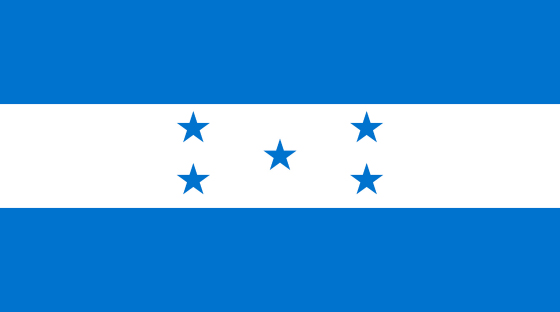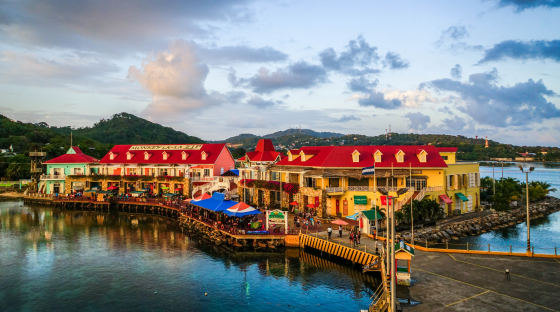Honduras

Overview
Located in the geographic heart of Central America and rich in natural resources, Honduras is a country of rainforests and Mayan ruins, fringed by the world’s second-largest barrier reef. Its economy is heavily reliant on the US and remittances make up almost 29% of GDP, the highest ratio in Latin America. While the tech sector has yet to mature fully, software development companies across the region are expanding their networks into Honduras by establishing remote teams in the main centers.
The Government is looking to build on a recent increase in the tourism industry, with the number of international visitors projected to reach 2.5 million in 2024. Copán, a ruined ancient city near the Guatemalan border, is considered one of the most spectacular archaeological sites of the ancient Maya civilization and is on UNESCO’s World Heritage list.
A fledgling industry in eco-tourism is also being developed. About 56% of Honduras has forest cover – including the Moskitia, Central America’s second-biggest rainforest. The country dedicates 10% of its police force to protecting the rainforests, a move that has cut deforestation, largely caused by cattle ranching, in the past two years.
The Accelerance Global Network is the most curated list of high-quality global teams ever assembled.
20
Developers
Total number of developers in our certified partner network by country
1
Certified Partner
Total number of certified partners in our global network by country.
4.5hrs
Time Travel (From NY)
Average flight time from NY to the major cities in the country.
82
Partner Innovation capability
The score reflects investment in STEM progrms and IT funding by country.
83
Partner Skill Level
Level of workforce skills and quality of education, including factors such as digital literacy, interpersonal skills, etc.
77
Partner Global Competitiveness
National productivity based on 12 core pillars, including government policy, infrastructure, economic stability, etc.
Medium
Software Outsourcing Readiness
Overall rating, based on the maturity of the tech sector, socio-political conditions, and on-the-ground research by Accelerance.

Talent Pool & Education
A pillar of the government’s ICT agenda, led by the Honduran Digital Republic, is the reduction of the country’s digital divide through a program targeting public infrastructure investment in neglected areas and assigning at least 1% of GDP to science, technology, and innovation. A “Smart Cities” initiative in San Pedro Sula and Puerto Cortés is leading the charge through ambitious schemes aimed at the modernization of urban infrastructure, digital connectivity, and community engagement.
While the percentage of bilingual skilled labor is among the highest in the region, a lack of transparency and poor ease of doing business deters any significant investment in the ICT sector, which remains small. The energy grid is also vastly unreliable and expensive compared to other countries in the region, and 5G implementation is not expected within the next three years.
However, the country’s potential is highlighted by companies in other parts of Latin America recruiting in Honduras and setting up satellite software development hubs there. The Honduran Institute of Science and Technology has been tasked with incentivizing interest in education and research, promoting the culture of scientific research, and technological development in the country. The focus of the institute centers on materials development, environmental technologies, applied electronics, biotechnology, and ICT research and development.
Language
Spanish is the official language but many professionals and business executives speak English and have been educated in the United States. The country also has hundreds of widely adopted bilingual schools based on a Spanish/English immersion model and these students typically outperform their peers on national university admission examinations.

Economic Outlook
The Economist Intelligence Unit forecasts only a slight economic slowdown in 2024, with political turbulence moderated by a resilient US economy and the country’s new lending agreement with the IMF. Nevertheless, the government's unfriendly stance towards the private sector will remain a constraint on the business environment. Inflation has continued on a downward track since peaking above 9%, the highest rate since 2008.
Honduras is one of the poorest and most unequal countries in the region. In late 2020, two hurricanes caused $2 billion worth of damage and affected 40% of the population. The post-pandemic recovery of the economy and labor market have contributed to an improvement in social conditions and the minimum wage increased by up to 7% in early 2024.
Almost a third of Hondurans work in the agricultural sector, which is vulnerable to climate change. To help face the crisis and achieve its environmental goals, the country has introduced several green budgeting mechanisms, one of the few to do so in the Latin America region.
Political Conditions
Honduran President Xiomara Castro, the country’s first female leader, led the left back to power in 2022 after 12 years of rule by the right-wing National Party, marked by electoral fraud and the infiltration of organized crime into state affairs. In March 2024, her predecessor Juan Orlando Hernández (2014-2022) was convicted on drug trafficking and firearms charges after extradition to the US.
Halfway through her term, Castro’s record is viewed as mixed, and little progress has been made on fulfilling a campaign pledge to install an International Commission against Impunity in Honduras, seeking to uncover past corruption. In mid-2023, Castro visited China after the two nations re-established diplomatic ties, distancing Honduras from its former ally Taiwan. Investment from China is being secured for large infrastructure projects, including a new hydroelectric dam along the Patuca River. Government spending has increased and the military has been deployed into security roles, allowing them to patrol certain areas and impose curfews.
Another key platform is saving the country’s rainforests and addressing climate change by selling carbon offsets generated by deploying more renewables or energy-efficient technologies. The funds would create jobs in sustainable forestry and enhance coffee production while planting trees to restore the country’s forests. Eco-tourism could eventually become a high-value enterprise. “The hope is to reduce poverty, stop immigration, and limit deforestation,” Castro told Forbes at COP28 in Dubai. “This is a fight against the enemies of the rainforests and wildlife and to show how the rainforests can reduce pollution and capture CO2.”
Learn more about our customer stories.
Looking for a customer story in a specific technology or industry? Discover compelling customer narratives within a specific technology or industry that resonate with your unique software development needs.


.png?width=300&name=Copy%20of%20WEBSITE%20Stop%20Chasing%20Low%20Hourly%20Rates%20Unlock%20the%20True%20Value%20of%20Offshore%20Development%20(450%20x%20253%20px).png)



